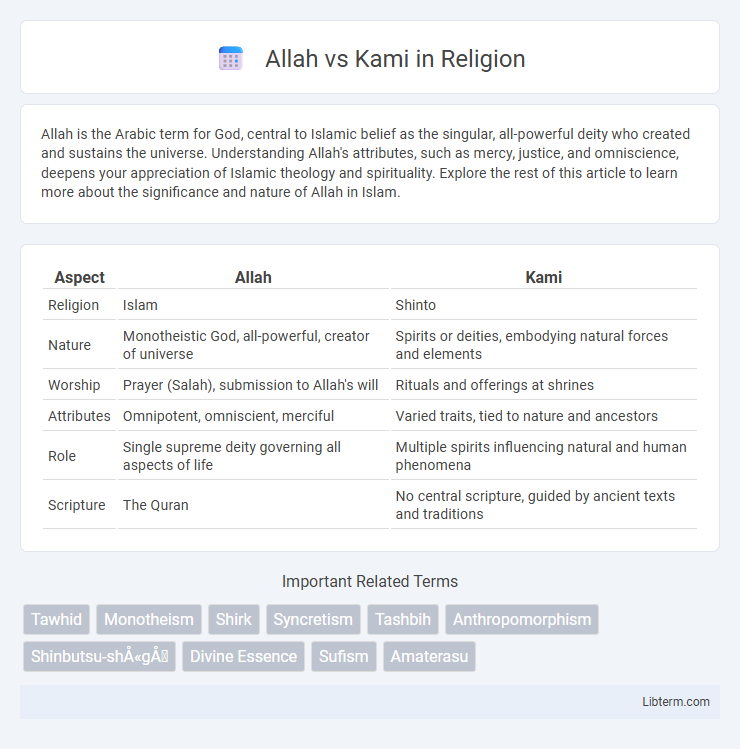Allah is the Arabic term for God, central to Islamic belief as the singular, all-powerful deity who created and sustains the universe. Understanding Allah's attributes, such as mercy, justice, and omniscience, deepens your appreciation of Islamic theology and spirituality. Explore the rest of this article to learn more about the significance and nature of Allah in Islam.
Table of Comparison
| Aspect | Allah | Kami |
|---|---|---|
| Religion | Islam | Shinto |
| Nature | Monotheistic God, all-powerful, creator of universe | Spirits or deities, embodying natural forces and elements |
| Worship | Prayer (Salah), submission to Allah's will | Rituals and offerings at shrines |
| Attributes | Omnipotent, omniscient, merciful | Varied traits, tied to nature and ancestors |
| Role | Single supreme deity governing all aspects of life | Multiple spirits influencing natural and human phenomena |
| Scripture | The Quran | No central scripture, guided by ancient texts and traditions |
Understanding Allah: The Islamic Concept of God
Allah in Islam represents the singular, omnipotent, and compassionate God who is the sole creator and sustainer of the universe. Unlike Kami in Shinto, which are numerous spirits or deities associated with natural phenomena and ancestors, Allah embodies absolute monotheism, emphasizing divine unity (Tawhid) and transcendence. Islamic teachings about Allah focus on His attributes of mercy, justice, and omniscience, guiding believers in worship and ethical conduct through the Quran and Hadith.
Kami in Shinto: Divine Spirits Explained
Kami in Shinto are divine spirits that embody natural phenomena, ancestors, and sacred places, playing a central role in Japanese spirituality. Unlike Allah in Islam, who is a singular, omnipotent deity, Kami are numerous spirits with distinct attributes and localized significance. Their presence is celebrated through rituals and festivals that emphasize harmony with nature and community.
Key Differences Between Allah and Kami
Allah, central to Islamic theology, is the singular, omnipotent, and omniscient God who is worshipped as the sole creator and sustainer of the universe. Kami, in Shinto belief, refers to a diverse range of spirits or deities associated with natural elements, ancestors, and phenomena, embodying a polytheistic and animistic tradition. The key difference lies in monotheism versus animistic polytheism: Allah represents an absolute, formless divine unity, while Kami encompasses multiple spirits connected to nature and ancestral heritage.
Origins and Historical Contexts
Allah originates from pre-Islamic Arabian polytheism, evolving into the singular omnipotent deity in Islamic theology, embodying monotheism rooted in Abrahamic traditions. Kami are spirits or deities in Shinto, indigenous to Japan, representing natural elements and ancestors, reflecting animistic beliefs dating back to ancient Japanese culture. Both concepts arise from distinct cultural and religious contexts, with Allah emphasizing monotheistic worship and Kami expressing a diverse, nature-centric spirituality.
Core Beliefs: Monotheism vs. Polytheism
Allah embodies strict monotheism, central to Islam, emphasizing the belief in one indivisible God who is the sole creator and sustainer of the universe. Kami, in Shintoism, represent a diverse array of spirits or deities associated with natural elements, ancestors, and phenomena, reflecting a polytheistic belief system. The fundamental distinction lies in Allah's singular divine essence contrasted with the multiple manifestations of divine entities in Kami worship.
Worship Practices of Allah and Kami
Worship practices of Allah in Islam emphasize daily prayers (Salah), fasting during Ramadan, and the pilgrimage to Mecca (Hajj), reflecting strict monotheism and submission to one God. In contrast, Kami worship in Shinto centers around ritual offerings, purification rites, and festivals (matsuri) honoring spirits believed to inhabit natural phenomena and ancestral beings. Both practices involve deep reverence but differ fundamentally in theological focus and ritual expression.
Sacred Texts: Qur’an and Shinto Scriptures
The Qur'an serves as the central sacred text in Islam, presenting Allah as the singular, omnipotent deity who is the creator and sustainer of the universe, guiding moral and spiritual conduct through detailed revelations. In contrast, Shinto scriptures such as the Kojiki and Nihon Shoki describe Kami as numerous divine spirits or gods embodying natural phenomena, ancestors, and sacred concepts rather than a single omniscient being. Both texts play crucial roles in shaping their respective religious practices, with the Qur'an emphasizing monotheism and Shinto scriptures focusing on polytheism and harmonization with nature.
Allah and Kami in Daily Life
Allah, the singular God in Islam, embodies ultimate authority and guidance in a Muslim's daily life, influencing actions through prayer, moral conduct, and adherence to the Quran's teachings. Kami, in Shinto belief, are spirits or deities representing natural elements and ancestors, affecting daily rituals and respect for nature among followers. The presence of Allah shapes structured worship and ethical principles, while Kami inspire a harmonious relationship with the environment and community traditions.
Comparative Influence on Culture and Society
Allah, central to Islam, profoundly shapes the cultural, legal, and social frameworks in Muslim-majority societies through principles derived from the Quran and Hadith. Kami, intrinsic to Shinto belief in Japan, influences local traditions, rituals, and community values by emphasizing harmony with nature and respect for ancestral spirits. The comparative influence of Allah centers on monotheistic worship and universal moral laws, while Kami affects regional identity and animistic practices, reflecting distinct ways religion informs social cohesion and cultural expression.
Fostering Interfaith Understanding
Allah, the singular, omnipotent deity in Islam, embodies compassion and justice, guiding over 1.8 billion Muslims worldwide through the Quran, while Kami, central to Shinto belief, represents spirits or phenomena reflecting nature's sacredness in Japan. Both concepts emphasize reverence for the divine and ethical living, fostering dialogue rooted in mutual respect and spiritual insight. Exploring these distinctions and commonalities promotes interfaith understanding by highlighting diverse expressions of faith and shared values across cultures.
Allah Infographic

 libterm.com
libterm.com